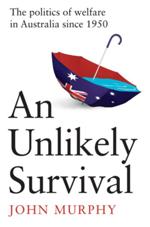An Unlikely Survival takes us through three-quarters of a century of welfare politics in Australia, to contests about political principles, and about what we think is the common good. As both economy and society were transformed, the need for government assistance, alongside the growth of civil society advocacy, became a core part of political debates. John Murphy traces the evolution of welfare, government by government, from Menzies to Morrison, from the postwar era of full male employment to neoliberalism, deregulation and globalism. He ranges across policy areas well beyond Centrelink payments, from wage fixing to work-for-the-dole, from childcare to middle-class tax benefits, from family payments to superannuation, from aged care to Indigenous welfare, and from Medicare and to disability support. How did the Hawke-Keating governments square neoliberal economics with reforming social welfare? What did successive governments retain, modify or dismantle? Who were the civil society actors who fought for and against different initiatives? What accounts for the unlikely survival and refurbishment of our welfare system in a world of more diverse families, globalisation, unemployment and the entrenchment of the working poor? An Unlikely Survival explores, and attempts to answer some profound questions about policy action and social justice in the past and in contemporary Australia and asks- do we actually want a fairer society-and are we prepared to pay for it?

An unlikely survival : the politics of welfare in Australia since 1950
ISBN: 9780522880458
Format: Paperback
Publisher: Melbourne University Pub (UBD)
Origin: AU
Release Date: December, 2024


